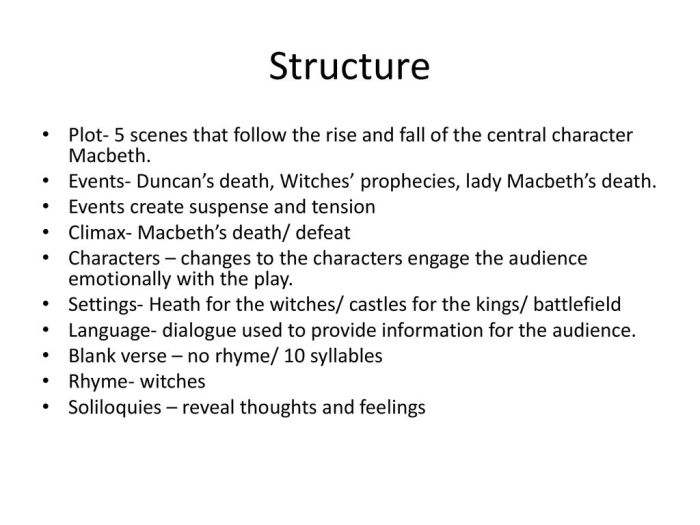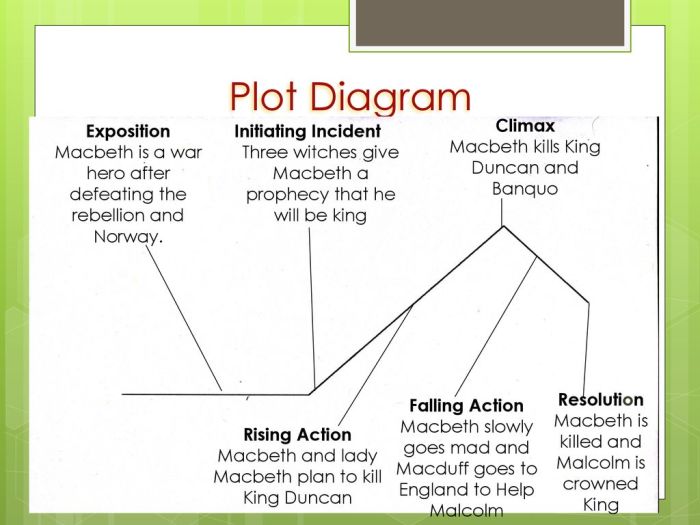What is the climax of macbeth – Delving into the heart of Shakespeare’s iconic tragedy, “Macbeth,” we embark on a journey to unravel the climax—the pivotal turning point that irrevocably alters the play’s trajectory and leaves an indelible mark on its characters and themes.
The climax of “Macbeth” is a masterfully crafted moment that encapsulates the play’s central conflicts, propelling the narrative towards its inevitable conclusion. It is a moment of intense drama, heightened emotions, and profound psychological shifts that sets the stage for the play’s tragic denouement.
Introduction
Macbeth is a tragedy by William Shakespeare, first performed in 1606. The play follows the story of Macbeth, a Scottish general who is driven to murder and madness by his ambition to become king.The climax of a narrative is the point of greatest tension and drama, the turning point where the protagonist faces their greatest challenge and the outcome of the story is decided.
In Macbeth, the climax occurs in Act IV, Scene III, when Macbeth confronts his enemy Macduff in a final battle.
The Climax
The climax of Macbeth is a scene of intense violence and emotion. Macbeth has just murdered Macduff’s wife and children, and Macduff is consumed by grief and rage. The two men fight, and Macbeth is ultimately killed.The climax of Macbeth is a turning point in the play.
The climax of Macbeth is the pivotal moment in the play where the protagonist’s fate is sealed. It is a scene of intense drama and emotion, as Macbeth’s guilt and paranoia consume him. Just like what etux means on a deed holds great significance in the realm of legal documents, the climax of Macbeth holds immense weight in the play’s narrative.
It is the moment when Macbeth’s ambition finally catches up to him, and he is forced to face the consequences of his actions. The climax also marks the beginning of the play’s resolution, as Macduff takes his place as the rightful king of Scotland.
The Turning Point

The Murder of Duncan
The climax of Macbeth occurs in Act III, Scene 4, when Macbeth murders King Duncan. This pivotal event marks a turning point in the play for several reasons:
-
-*Macbeth’s Moral Decline
The murder of Duncan represents a significant moral transgression for Macbeth. It is a violation of his loyalty to the king and a betrayal of his own conscience. This act plunges Macbeth into a downward spiral of guilt, paranoia, and violence.
-*The Shift in Power Dynamics
The murder of Duncan alters the balance of power within the play. Macbeth’s ambition and ruthlessness allow him to seize the throne, but his reign is marked by fear and instability. The act of regicide creates a ripple effect that disrupts the natural order and leads to widespread chaos and bloodshed.
-*The Introduction of the Supernatural
The murder of Duncan is also significant because it introduces the supernatural element into the play. The witches’ prophecies, the appearance of Banquo’s ghost, and the ambiguous nature of the sleepwalking scene all contribute to a sense of unease and foreshadowing.
These elements create an atmosphere of tension and uncertainty, hinting at the consequences that await Macbeth.
-*The Emotional Impact
The murder of Duncan is a harrowing and emotionally charged scene. The audience witnesses Macbeth’s inner struggle as he grapples with the consequences of his actions. The scene is filled with suspense, fear, and a sense of impending doom, leaving a lasting impact on the audience.
Macbeth’s Transformation

Macbeth’s journey to the climax of the play is marked by a profound transformation from a noble warrior to a ruthless tyrant. His ambition, fueled by the witches’ prophecies and his wife’s manipulation, leads him down a path of violence and deceit.
The Turning Point
The pivotal moment in Macbeth’s transformation occurs after the murder of Duncan. Initially, Macbeth is horrified by his actions, but Lady Macbeth’s unwavering support and his own desire for power drive him to further atrocities. Each subsequent murder erodes his moral compass and reinforces his sense of guilt and paranoia.
Psychological Implications
Macbeth’s transformation has severe psychological consequences. His guilt manifests as hallucinations, such as the appearance of Banquo’s ghost. He becomes increasingly isolated and suspicious, losing trust in those around him. The weight of his crimes weighs heavily on his mind, leading to insomnia and mental anguish.
Moral Implications
Macbeth’s actions have profound moral implications. His betrayal of trust and disregard for human life shatter the social order. His descent into tyranny highlights the corrosive effects of ambition and the consequences of unchecked evil. Macbeth’s transformation serves as a cautionary tale about the dangers of allowing ambition to corrupt one’s soul.
The Consequences: What Is The Climax Of Macbeth

The climax of Macbeth triggers a cascade of dire consequences that reverberate through the play’s final act. The repercussions of Macbeth’s heinous actions exact a heavy toll on him, Lady Macbeth, and the kingdom they once ruled.
The Impact on Macbeth
- Descent into Madness:Macbeth’s guilt and paranoia spiral out of control, driving him to the brink of insanity. He experiences hallucinations, including the haunting image of Banquo’s ghost, and his once-rational mind succumbs to delusion.
- Isolation and Loss:Macbeth’s tyranny alienates him from his allies and subjects. He becomes a solitary figure, haunted by the consequences of his crimes and the realization of his impending downfall.
- Physical and Mental Deterioration:The weight of his actions takes a physical and mental toll on Macbeth. He becomes increasingly gaunt and haggard, his sleep is plagued by nightmares, and his mind is consumed by fear and despair.
Dramatic Significance
The climax of Macbethis the pivotal moment in the play, where the tension and conflict reach their peak. It marks a turning point in the protagonist’s journey, leading to the unraveling of events and the resolution of the plot.
The play’s dramatic structure is carefully crafted to build up to the climax, employing techniques such as foreshadowing, irony, and suspense. The witches’ prophecies, for example, foreshadow Macbeth’s rise and fall, creating a sense of inevitability and anticipation. Irony is used to contrast Macbeth’s ambitions with his actions, highlighting the gap between his desires and reality.
Foreshadowing
- The witches’ prophecies foreshadow Macbeth’s rise to power and his eventual downfall.
- The appearance of Banquo’s ghost at the banquet foreshadows Macbeth’s guilt and paranoia.
Irony, What is the climax of macbeth
- Macbeth’s ambition to become king ultimately leads to his downfall.
- Macbeth’s attempts to control his fate through violence only lead to more chaos and bloodshed.
Suspense
- The play’s suspenseful atmosphere is created through the use of supernatural elements, such as the witches and Banquo’s ghost.
- The audience is kept on the edge of their seats as they anticipate Macbeth’s next move and the consequences of his actions.
The climax of Macbethserves as a catalyst for the play’s resolution. It is the moment when Macbeth’s true nature is revealed, and the consequences of his actions begin to take hold. The play’s tragic ending is a direct result of the climax, as Macbeth’s ambition and guilt ultimately lead to his downfall.
Literary Analysis

The climax of Macbethstands as a towering moment in Shakespearean drama, renowned for its intensity and profound impact on the play’s narrative. By comparing it to other literary climaxes, we can appreciate its unique qualities and the techniques employed to create a memorable and significant event.
Common elements found in powerful climaxes include heightened tension, dramatic irony, and a turning point that irreversibly alters the course of the story. In Macbeth, these elements converge in the confrontation between Macbeth and Macduff.
Comparison to Other Literary Climaxes
The climax in Macbethshares similarities with the climactic scenes in Hamletand Othello. In each case, the protagonist’s downfall is precipitated by their own actions and the consequences of their choices. However, the climax in Macbethis distinct in its relentless intensity and the sense of inevitability that permeates the atmosphere.
Techniques Used to Create a Powerful Climax
Shakespeare employs several techniques to create a powerful climax in Macbeth. These include:
- Foreshadowing:The witches’ prophecies and Macbeth’s soliloquies foreshadow the tragic events that will unfold.
- Irony:The audience is aware of Macbeth’s guilt and the consequences that await him, creating a sense of dramatic irony.
- Suspense:The tension builds steadily as Macbeth’s plans unravel and his paranoia intensifies.
Unique Aspects of the Climax in Macbeth
The climax in Macbethis unique in several ways:
- The protagonist’s downfall is complete:Macbeth’s ambition and guilt consume him, leading to his physical and moral destruction.
- The battle is symbolic:The final confrontation between Macbeth and Macduff represents the struggle between good and evil, order and chaos.
- The climax is cathartic:The audience experiences a sense of release and resolution as Macbeth’s reign of terror comes to an end.
In conclusion, the climax of Macbethis a masterfully crafted moment that combines common elements of powerful climaxes with unique aspects that make it a memorable and significant event in literature.
Question Bank
When does the climax of “Macbeth” occur?
The climax of “Macbeth” occurs in Act III, Scene iv, when Macbeth confronts the witches and receives a series of ambiguous prophecies that drive him to commit further atrocities.
What is the significance of the climax in “Macbeth”?
The climax marks the point of no return for Macbeth, as his ambition and guilt spiral out of control, leading him down a path of destruction.
How does the climax contribute to the play’s overall impact?
The climax serves as a catalyst for the play’s resolution, intensifying the dramatic tension and setting the stage for the tragic downfall of Macbeth and Lady Macbeth.